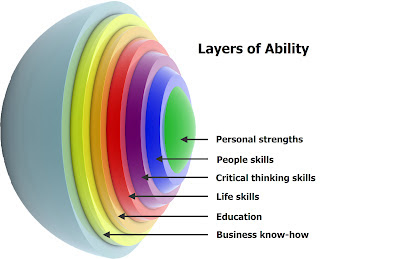You began some of this learning when you were young, but the learning didn’t end when you became an adult. Later, you acquired know-how that you needed for your various roles, whether as a parent, an entrepreneur, a teacher or a scientist. But that’s not enough.
At the core of all your abilities are two areas that count more than any others: personal strengths and people skills. These are critically important to everything you’ll ever accomplish in life. And yet they aren’t formally taught in schools. They’re most often acquired through life experience, but usually not in a systematic way.
Why personal strengths matter
You have to be strong to overcome the adversity you’re going to encounter when you do hard things. It doesn’t matter if you have good skills. If you’re not equipped to deal with the inevitable challenges that come your way, you won’t get the results you hope for.
Let’s say you play tennis and you want to get better. So you take lessons and practice until you get really good. But having the skill doesn’t guarantee you’ll play well when you get in a tough competitive situation.
That’s because the unexpected could happen. Your competitor may have better skills and energy…or you’ll make mistakes during play…or the match could go on longer than you thought it would.
Now what?
Skill alone isn’t enough. Under these conditions, you could become intimidated or tired. You might lose your cool. So besides skill, you’ve got to have personal strengths.
To win the match, you’ll need to maintain your composure, self-confidence, and focus. You have to keep giving your best effort and persevere, even when you start feeling tired or discouraged.
Think of it as the inner strength to execute your abilities in tough situations.
Personal Strengths are much more than passive qualities or virtues. They’re observable behavior patterns and life habits. For example:
- How do you respond when someone blows up at you? Or criticizes you in front of others?
- What do you do when things don’t go your way? Or you’re stuck in traffic or a long line?
Where people skills fit in
No matter what you pursue in life, you need the ability to deal effectively with others. This second core area has a huge impact on nearly everything you do.
To build and maintain strong relationships, you’ll need to develop skills such as listening, resolving conflict, giving encouragement, and receiving feedback.
Building personal strengths and people skills requires more than knowledge or having a positive attitude. It’s about DOING. You have to apply the behaviors over and over in the real world if you want them to get stronger and become your natural way of doing things.
And that’s why we created ProStar Coach. It’s an online virtual coaching system focused exclusively on helping you develop these two core areas – personal strengths and people skills. It’s got a proven structure for building the skill and rewiring your brain so a specific behavior becomes comfortable and automatic.
If you’re serious about your own development, you’ll need to address all the layers of ability. Just make sure you give adequate attention to the two core abilities. They’re the foundation for building all the others.
"Strength does not come from winning. Your struggles develop your strengths. When you go through hardships and decide not to surrender, that is strength." - Arnold Schwarzenegger, American Actor (1947- )






Great article, Meredith. I have reblogged it, here:
ReplyDeletehttp://teamlegionnaire.wordpress.com/2012/03/20/whats-at-the-core-of-your-abilities/
Gene / on Twitter as @PablodeFleurs
Thanks so much for your positive feedback and for sharing the message!
ReplyDeleteYeah!! I am agree with you and your diagram is accurate for knowing the ability. We can say that ability means that all element of the diagram. I am sure if people follow your diagram then can be develop their skills where the are working still.
ReplyDelete